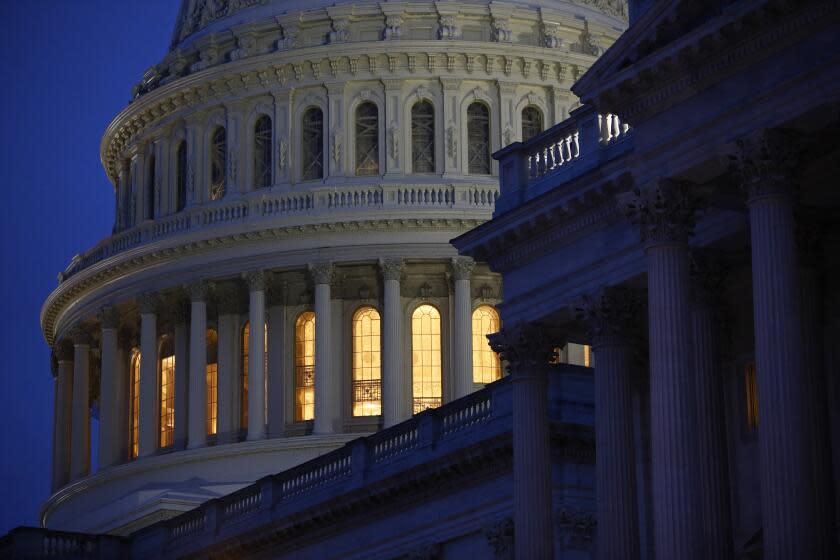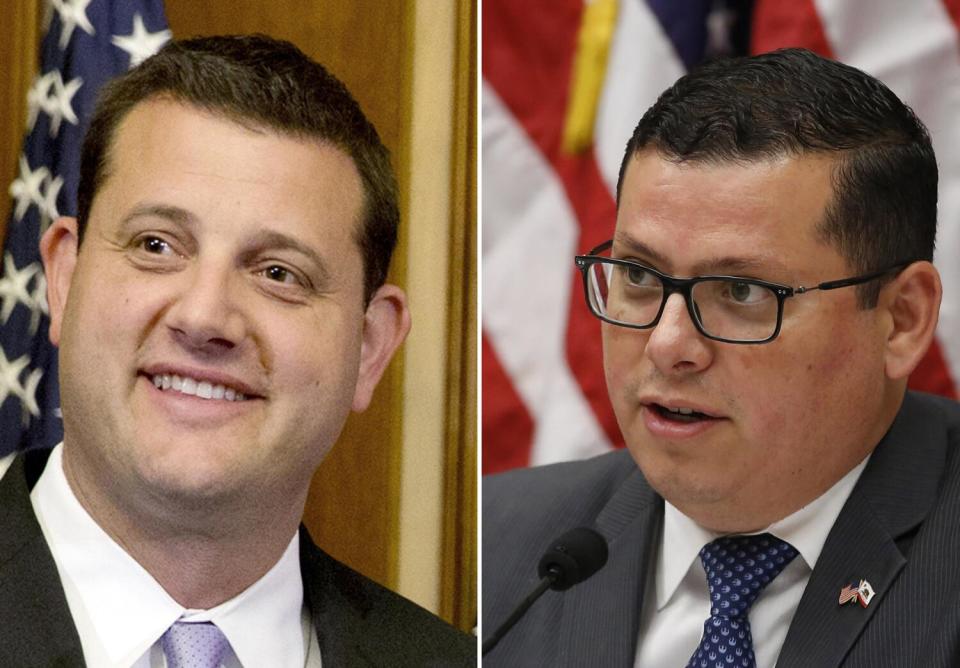Six California House races that could help determine control of Congress

- Oops!Something went wrong.Please try again later.
- Oops!Something went wrong.Please try again later.
- Oops!Something went wrong.Please try again later.
- Oops!Something went wrong.Please try again later.
- Oops!Something went wrong.Please try again later.
- Oops!Something went wrong.Please try again later.
- Oops!Something went wrong.Please try again later.
Over 2,000 miles west of the nation's Capitol, the battle for control of the House of Representatives in 2025 is being waged in farmland along Highway 99, fast-growing commuter communities north and east of Los Angeles and Orange County beach towns and inland suburbs.
While Republicans currently have a razor-thin majority in the House, partisan makeup of next year's Congress will almost certainly be decided this November — at least in part — by a handful of hypercompetitive California races.
California "is, along with New York, one of the two most important paths to potential Democratic control of the House," said Dave Wasserman, senior editor and elections analyst for the nonpartisan Cook Political Report.
Democrats underperformed in both states in 2022, in part because their in-state political dominance helped Republicans channel voter frustration into anger toward Democrats, Wasserman explained.
But many of these districts are likely to perform better for Democrats in a presidential cycle, given former President Trump's spot at the top of the Republican ticket. (The former president remains unpopular in California and faces criminal prosecution in four separate trials, all of which make his presence on the ballot a potential hindrance for California GOP candidates.)
Read more: ‘Path to 218 runs through California’: State races pivotal in fight to control the House
"If Democrats are to have any hope of winning the majority, they probably need to win at least three Republican seats in California," Wasserman said.
The Cook Political Report has rated 10 California races as competitive, with six of them rated as either lean Democratic or lean Republican or a tossup.
Those six most competitive races are also all being targeted by both the Democratic Congressional Campaign Committee and the National Republican Congressional Committee, with establishment party backing likely to bring even more attention and funding into the districts.
Five of the six seats are currently held by Republicans, with four of those five in congressional districts that President Biden won in the 2020 election.
The other four races — which include the seats currently held by Reps. Josh Harder (D-Turlock), Mike Levin (D-San Juan Capistrano), Young Kim (R-Placentia) and Kevin Kiley (R-Rocklin) — are in Cook's slightly less pliable "likely Republican" or "likely Democrat" categories.
With a little more than six months to go until Election Day, here are the most hotly-contested races to watch.
CA - 27: Rep. Mike Garcia versus George Whitesides

The district at the northern edge of Los Angeles County's suburban sprawl was staunchly Republican territory for more than a quarter-century before 2018's blue wave, when a young, dynamic candidate flipped the seat and helped retake Democratic control of the House.
Katie Hill's meteoric political rise met a quick fall less than a year later, with the freshman congresswoman resigning amid a sex scandal.
What had been a coveted Democratic victory rapidly became a rare special election for a competitive open seat, which was filled by Republican former U.S. Navy pilot and defense industry executive Mike Garcia. Garcia won a full term in 2020 and again in 2022, facing off against the same Democratic opponent, Christy Smith, in all three races. (Garcia won by a few hundred votes in 2020, but by more than 12,000 votes in 2022.)
The Democrats are backing a new candidate this time around: George Whitesides, the former chief executive of space tourism company Virgin Galactic. Whitesides' wealth has allowed him to put more than $1 million into his campaign, which will help in one of the most expensive media markets in the country.
The district includes Santa Clarita, Palmdale and Lancaster, encompassing both suburbs and high desert. Democrats have a nearly 12-point registration advantage and Biden won the district by more than 12 points in 2020, according to data from California Target Book. Voters stating no party preference account for more than a fifth of the electorate.
Whitesides has far more money in his arsenal, with $3 million on hand to Garcia's roughly $1.8 million reserve, according to the most recent campaign finance filings.
CA - 47: State Sen. Dave Min versus Scott Baugh

California’s 47th District is the only open seat of the bunch, and that’s a good thing for Republicans.
Back in 2022, Republican Scott Baugh narrowly lost to Rep. Katie Porter (D-Irvine), coming just a few points short of unseating a nationally known Democratic Party superstar backed by her own fundraising juggernaut.
With Porter and her whiteboard out of the picture after a failed Senate bid, the former GOP Assembly leader’s competition appears less formidable this time around. The Democratic challenger, state Sen. Dave Min, has little of Porter’s star power. During the March primary, fellow Democrat Joanna Weiss also battered him over a 2023 DUI arrest, a controversy Baugh and Republicans are expected to focus on during the November election.
That rough primary also put Min at a financial disadvantage going into November. He and Baugh have both raised around $2.3 million, but as of the last campaign finance filing period, Min had a little more than $400,000 left in his war chest, whereas Baugh had $1.9 million.
The coastal Orange County district includes the cities of Costa Mesa, Huntington Beach, Irvine and Newport Beach. It’s a majority white district, with not insubstantial Asian and Latino populations.
Democrats have a narrow registration advantage, although no party preference registrants account for nearly a quarter of voters. Biden won the district by more than 10 percentage points over Trump in 2020, according to data from California Target Book.
Baugh also has some vulnerabilities, including a political misconduct case he faced in the 1990s that resulted in a $47,900 fine. During the 2022 cycle, Porter hammered Baugh on those campaign violations, as well as his antiabortion stance.
Still, the district would be easier for Democrats to hold onto with Porter's incumbency and financial reserves, according to Wasserman.
"That said, Democrats remain the favorites here because Porter spent so much of her money defining Scott Baugh negatively last cycle," Wasserman said, though he noted that Min's DUI still offered opportunity for Republicans.
CA - 45: Rep. Michelle Steel versus Derek Tran
First elected in 2020, incumbent GOP Rep. Michelle Steel will be fighting to defend her seat in a C-shaped inland Orange County district that also includes a sliver of L.A. County.
Democrats held a five-percentage-point registration advantage as of late February and Biden won the plurality-Asian district in 2020, but despite the registration advantage, Republicans turned out in higher numbers than Democrats in the 2022 midterms. No party preference voters account for more than a fifth of the electorate.
Derek Tran emerged out of a jam-packed crowd of Democratic primary contenders, ultimately finishing several hundred votes ahead of third-place finisher Kim Nguyen-Penaloza. He is the son of Vietnamese refugees, works as an attorney and owns a pharmacy with his wife.
Steel, a Korean immigrant and one of the first Korean women elected to Congress, previously served as an Orange County supervisor and California State Board of Equalization member. Her husband is a former chair of the California Republican Party.
As a first-time candidate emerging from a crowded primary, Tran faces the challenge of building name recognition against a candidate who is already well known in the district.
That will be compounded by two things, said UC Irvine political science professor Louis DeSipio. Steel has a massive fundraising advantage, with more than $3 million on hand compared to Tran's nearly $200,000. She also has the benefits of incumbency.
"I think Tran has much more of an uphill battle to be able to get his issues and his name into voters' minds," DeSipio said.
The fact that Tran is the son of Vietnamese immigrants and has a Vietnamese surname could help him build name recognition but won't be determinative, DeSipio said. The district includes Orange County's Little Saigon and Vietnamese Americans account for about 17% of voters, according to Political Data, Inc.
CA - 41: Rep. Ken Calvert versus Will Rollins
This is yet another rematch from 2022, with Democratic former federal prosecutor Will Rollins once again hoping to unseat Rep. Ken Calvert (R-Corona), the longest-serving member of California's congressional delegation.
Calvert — who has represented parts of the Inland Empire for more than three decades — narrowly staved off Rollins last cycle in a race that was far more competitive than expected. This time, Rollins will be aided by the full backing of the Democratic Party and far more fundraising support.
The Riverside County seat also became slightly more favorable to Democrats in the last round of redistricting, with the addition of Palm Springs and Rancho Mirage on its eastern edge.
Read more: LGBTQ+ culture wars surface in heated Riverside County congressional race
The majority of the district remains on Calvert's home turf of the Inland Empire, but the desert additions now give it one of the largest concentrations of LGBTQ+ voters in the nation.
Calvert has a history of voting against LGBTQ+ rights, as The Times has previously reported, but said during the 2022 campaign that his views had since evolved. That record will almost certainly come under fire in the Coachella Valley as he faces off against Rollins, a gay man who lives with his partner in Palm Springs.
Still, culture war issues are likely to take a backseat to the bread-and-butter economic matters driving daily discourse in the bulk of the district, including inflation, the cost of housing and the extreme commutes that many bedroom community residents face. Public safety and immigration will also likely factor into the campaign.
Democrats and Republicans are virtually tied in registration numbers, with Republicans recently taking on a several thousand-voter advantage, as of early April. Trump won the district in 2020 by a little more than one percentage point, according to data from California Target Book.
Rollins had about $3.2 million on hand as of the last filing period, while Calvert had about $2.6 million.
CA -13: Adam Gray versus Rep. John Duarte

In a heavily agricultural San Joaquin Valley district that encompasses all of Merced County and parts of Fresno, Madera, San Joaquin and Stanislaus counties, Republican Rep. John Duarte of Modesto will once again face off against Adam Gray after narrowly vanquishing the Democrat in 2022.
Two years ago, this was the second-closest House race in the nation, with Duarte winning by just 564 votes. It will be one of the most avidly watched races in the country again this year.
"Right now, the single most vulnerable Republican incumbent is John Duarte, in my view," Wasserman said of the California races.
“Adam Gray came within a hair of winning the seat [in 2022]. Duarte is not yet as established a political brand as [David] Valadao,” Wasserman explained, comparing the freshman representative to his five-term GOP counterpart to the south. “And in a presidential cycle, this district ought to vote for a Democrat.”
The district had low Democratic turnout in 2022 but favored Biden by 11 points in 2020, according to data from California Target Book.
Read more: On the issues: John Duarte and Adam Gray on abortion, inflation and Central Valley water wars
Wasserman stressed that there were still open questions about the strength of Biden’s support among Latino voters. A scenario where Trump manages to make inroads with those voters would favor Duarte, Wasserman said.
The district has a slight Latino majority, with white voters also accounting for nearly 40% of the electorate, according to data from California Target Book. It includes cities like Madera, Ceres and Merced and portions of Modesto and Turlock, as well as rural swaths of the San Joaquin Valley.
Despite Biden’s double-digit margin of victory in 2020, Republican gubernatorial candidate Brian Dahle beat Gov. Gavin Newsom by more than eight points in the district in 2022, a partisan see-sawing that speaks to the large number of independent voters in the district as well as strong Republican turnout in the 2022 midterms.
As of late February, Democrats held a 13-percentage-point registration advantage, while no party preference voters made up more than a fifth of the electorate.
Gray significantly outraised Duarte in the most recent filing period ending on March 31, but Duarte still has more cash on hand, with $1.8 million, to Gray's $1.2 million reserve, according to federal filings.
CA - 22: Rep. David Valadao versus Rudy Salas

Once a safely ruby-red Republican domain, California’s 22nd Congressional District is in a part of the San Joaquin Valley that has grown increasingly purple in recent years, with Democrats now holding the registration advantage.
As in the 13th District to the north, economic issues and inflation will likely be top of mind for these voters. Issues regarding water — including water access for agriculture, as well as water quality and water availability in wells — will also be crucial, along with healthcare access issues, said Thomas Holyoke, a professor of political science at Fresno State University.
Tulare County dairy farmer Rep. David Valadao has been in office since 2013, save for a two-year interlude when he was temporarily ousted by Democratic challenger T.J. Cox during the 2018 blue wave of congressional victories nationwide. Valadao regained his seat in 2020 and was one of 10 House Republicans to vote for Trump’s impeachment after the Jan. 6 insurrection.
Read more: A farmworker's son and a dairy farmer battle to represent the Central Valley in Congress
The 22nd is a majority Latino district that includes parts of Kern, Tulare and Kings counties, several small towns and a portion of Bakersfield. Voters here favored Biden over Trump by 13 percentage points in 2020, making Valadao one of the most vulnerable GOP incumbents in the country.
He prevailed over Democratic challenger and former Assemblymember Rudy Salas by three percentage points in 2022, and the two will meet again this November.
Democratic infighting in the 2024 primary, when Salas faced competition from fellow Democrat Melissa Hurtado, cost the party establishment millions to consolidate support behind Salas.
Salas significantly outraised Valadao in the last quarter, but still has far less cash on hand.
This story originally appeared in Los Angeles Times.

